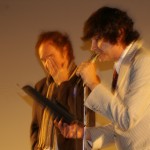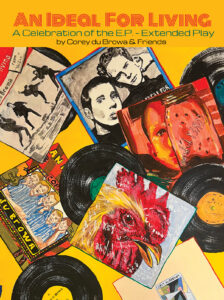![IMGP5548[1]](https://www.eastportlandblog.com/wp-content/uploads/2012/07/IMGP55481-e1342497037548-199x300.jpg) Portland, Oregon has done what no other US city has ever done (as far as I know), and that is declare by decree ad signed by the mayor, that July 15, 2012 was to be declared Ray Davies Day. To authenticate this, a ceremony was held at Portland’s historic Hollywood Theater, where the honored man made a personal appearance to accept the award.
Portland, Oregon has done what no other US city has ever done (as far as I know), and that is declare by decree ad signed by the mayor, that July 15, 2012 was to be declared Ray Davies Day. To authenticate this, a ceremony was held at Portland’s historic Hollywood Theater, where the honored man made a personal appearance to accept the award.
As we waited for the legendary Mr. Davies’ arrival, we were treated to films of old live Kinks clips and a short movie with Ray Davies in the starring role of a stage production of The Kinks’ 1975 Soap Opera album. Soap Opera is the story of a twenty-nine-year-old rock star who wants to experience “ordinary life” in order to write a musical about it. He takes the place of Norman, an ordinary man with an ordinary job, an ordinary wife, and ordinary home. However, our star is too wrapped up in himself and his fear of becoming “ordinary,” to fully comprehend what these so-called ordinary people are about. Although the production had some comical moments and Mr. Davies was very sexy in it, it wasn’t stellar material. Mostly the attempts at comedy fell flat, the characters weren’t likable and it was difficult to have empathy toward them.
Though I’m familiar with Soap Opera as an album and still own a vinyl copy, I never knew a filmed stage production of it existed. Soap Opera is one of the Kinks’ most critically panned works and instigated a petition signed by all the other Kinks to force Ray to return to their rock and roll roots. Soap Opera does have some memorable songs on it, to be fair. “Ducks On the Wall” and “Rush Hour Blues” are both great songs. But after they returned to their so-called roots, they put out some of their best material, creating masterpiece after masterpiece through the early eighties.
Up next was the appearance of the illustrious Ray Davies. He was presented with the award and made a short, humorous speech, and saying how he wished the Kinks were all present because this was as much their reward as his. The entire speech probably lasted less than ten minutes, and he was whisked away as quickly as he came.
Following the departure of Mr. Davies, his self-directed and written 1984 movie, Return to Waterloo was shown. I had seen this movie when it first came out (though I remember seeing it in 1985). I remember being under-impressed then. My views did not change after seeing the movie again nearly three decades later.
Return to Waterloo follows a nondescript forty something gentleman through his “ordinary” day of catching the train to head to his daily grind of a work a day world. Along the way he fantasizes about lusting after women who aren’t his wife, and has flashbacks of a borderline incestuous relationship with his teenaged daughter who subsequently runs away and is murdered. There are flashbacks of him identifying her body at the morgue, of him posing with her while she wears a skimpy bikini while his wife takes a picture.
![IMGP5546[1]](https://www.eastportlandblog.com/wp-content/uploads/2012/07/IMGP55461-300x199.jpg) While on the train he encounters a group of disaffected youth who look and behave like stereotypical punks and terrorize everyone else on the train with their loud music and threatening behavior. The sing about how the previous generation stole their future while the older passengers sing about the youth not respecting anyone and how they don’t recognize their country any more. Keep in mind, 1984 was the height of Thatcher’s reign.
While on the train he encounters a group of disaffected youth who look and behave like stereotypical punks and terrorize everyone else on the train with their loud music and threatening behavior. The sing about how the previous generation stole their future while the older passengers sing about the youth not respecting anyone and how they don’t recognize their country any more. Keep in mind, 1984 was the height of Thatcher’s reign.
There is barely any dialog in the movie, just singing and none of the songs are that memorable.
I am guessing the movie was trying to depict how people get on with their every day lives and stand in judgment of anyone who’s not like them and do not make any effort to understand others they perceive as different. There are scenes and events in the movie that don’t seem to hold any significance to the overall message of the film. Our traveller has flashbacks of himself as a boy of about eight years old waiting on a 1940s era train platform when our main character in the present pulls in, leans out of his train window and hands his younger self a set of keys. I’m not sure what the significance of this scene was except perhaps that he was handing his younger self the keys to his future. But what future? Our main character is a sad, lost soul and everyone else in the film is even less likable. The story just shows the worst of society without the humor Davies so often used in his songs.
Return to Waterloo is not a movie I recommend even for the most die-hard and ardent Kinks fans (a category to which I belong). Whatever message Ray Davies was trying to convey, it was lost. The story jumps through fantasies and flashbacks and back to reality and it’s difficult to tell which is which half the time. It’s even more difficult to understand why the characters do what they do. They’re all stereotypical shallow people. They aren’t interesting. In fact they’re so uninteresting, I sat through the movie wondering if our main character would come to some sort of resolution. Would he become someone I’d want to know? Would I end up having empathy for him? The answer to all these questions is negative. The movie didn’t really have a conclusion other than our characters going on with their miserable lives. Sorry, Ray, this movie just didn’t cut it. I guess even geniuses fall down sometimes.
All photos property of Holly Homan, all rights reserved.
Kinky Connections In Double – Or How I Met My Heroes, The Kinks, By Holly Homan





